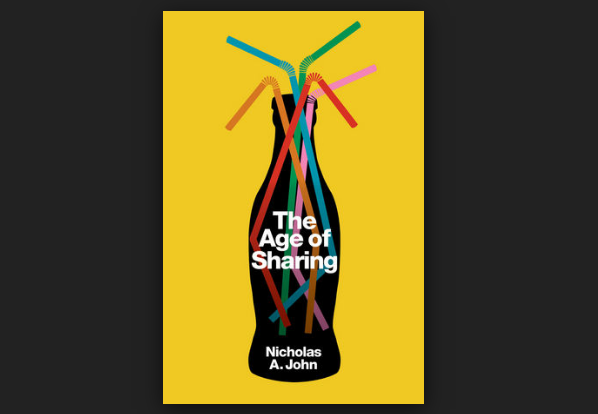The word "sharing" is everywhere these days. Technology has opened up numerous avenues for us to share almost every part of our lives, from our cars to our couches. But as more and more sharing economy companies crop up around the globe, it's necessary to pause and reflect on what the word "sharing" actually means. When we hail an Uber or rent an apartment on Airbnb, are we really participating in the sharing economy? What exactly is being shared in those two scenarios?
It's a thorny question, and to get at the heart of it, we talked to British-born, Israel-based new media researcher Nicholas John. In his book, "The Age of Sharing," John addresses the etymology of the word sharing and the place it has taken in our lives, including how corporations are capitalizing on the feeling the word invokes. "Companies understand the power of this and exploit language for their commercial gain," he says. Here are some highlights from our conversation:
Ruby Pratka: How did you get interested in studying the word sharing?
Nicholas John: I started researching it back in 2010-11 when I noticed that it was all over social media. At the time, it was the word used on Facebook for posting a status. Now it means something slightly different, but it just occurred to me then that it was all over the place.
At the time, I naively thought of "sharing" as the word for taking something and dividing it up. I looked into when it became the word for what we do online. I did a study of about 40 social media sites and looked at their front pages over a number of years using the Wayback Machine. I could see when the term became common currency on social media sites and I thought, okay, where else is this an important concept? It's also an emotional kind of talk. If you tell people you have something to share, you are indicating you have something important to tell them. And thirdly, it refers to a kind of distribution of resources.
Your book covers a lot of ground, from linguistics to history to economics to sociology. At what point did you realize there was a book here? What was the process of creating the book like for you as a researcher?
I loved it. It really enabled me to follow my nose and I learned a ton of stuff, although I didn't realize what was going to happen right away, although early on in the process, I thought that this was such a rich concept there could be a book in it. All of this is interconnected. We can understand sharing online through the idea of sharing emotions. We can understand each of these definitions through the other. You could write separately about online sharing, the sharing economy, and sharing as talk, and people do. But it would only be in a book that you could bring them all together.
How has the meaning of the word evolved over time?
What interests me about sharing is how it works as a metaphor. My approach to language is that all words have a history, new meanings get added to old words, words are given meaning by the way we use them. When people say that this or that concept is not really sharing, it doesn't conform to their idea of sharing, but where does their idea come from?
When you look into it, the idea of sharing that we have now is a very new idea. The word has been around since about the 16th century, but only about 100 years ago did it come to mean talking about your feelings. Only then did it become associated with the positive values of openness, trust, equality, reciprocity, kindness, and so on. The idea that sharing is caring is a new idea that does not go back further than the 70s. The concept of sharing as something that stands in opposition to materialism was developed by the hippie counterculture. In the past, [sharing] meant physically dividing up a resource, but it didn't imply anything to do with fairness — for example, a system of rent called crop-sharing meant that tenants would pay landlords with crops. No one in the 19th century said we can't call this sharing. The use of the word is very context-specific.
People say frequently in academic circles that sharing as we do it now is not really sharing — there are other words that have been brought forward, such as collaborative consumption, the gig economy, and collaborative capitalism. I'm not interested in defending business models of specific companies like Uber. I'm sympathetic to criticism of companies that operate within the sharing economy but have an ideology that says, "You must monetize everything you can and make use of all your resources to enrich yourself."
Why is this the age of sharing?
Right now we have three spheres of our social lives defined through the concept of sharing. First, we have our digital lives, where sharing is a mode of participation in social media. Second, sharing is the type of talk through which we maintain our intimate relationships. It's also a kind of economic activity, a kind of distribution. If we take for instance the concept of online sharing and the sharing economy, they move around these three spheres. People call the sharing economy digital, but it also stands for a kind of interpersonal relationship based on openness, trust, and honesty. These meanings are coalescing now in a way they haven't done in the past. Also, the metaphors we use shape the way we experience the world. People say that because we're applying the word sharing to a certain thing, we should be doing it in a way that is fair. The use of the term influences the way people feel. Companies understand the power of this and exploit language for their commercial gain. When a company that sells an app that enables you to rent your room and earn money, they hope you'll think of it as sharing, even though many would argue that it isn't.
Why did sharing become so closely associated with social media?
It wasn't singlehandedly Facebook's doing, but it happened around the time Facebook took off. I looked at platforms between 2000 and 2010, and sharing became associated with social media around 2005. You can look at old shots of Facebook when it was still called "TheFacebook" and sharing isn't there. In October 2006, they released the share button, where people could share content from outside websites to Facebook. It was around that time, you can imagine, that they had a strategy meeting and said, "We're going to go very strong on this." They were by no means the first but they were becoming the biggest fish in the sea. There's a parallel history of the word in computers with timesharing, where disk space could be divided among different users. You don't usually imagine Care Bears when you think about something like that — that's just what it's called.
How has the internet's meaning of sharing impacted offline life — or can we even talk about separate online and offline lives anymore?
For a long time we have been talking about separating our lives but we can't do that anymore — we can no longer separate our digital, economic, and emotional lives. In all of those, sharing refers to an expansion of the public sphere at the expense of the private. When we share something on social media, we're making it public. Social media companies want us to make our lives as public as possible, because that's the way they get more ad revenue. The idea of expanding the public at the expense of the private also applies to the sharing economy. If we think of two apps that let you engage with your neighbors, and one of them helps you lend and another helps you rent things out, in both cases you are giving access to something that's yours. Either way, we can see a growth of the public at the extent of the private. That can be used to increase ad revenues, but it can also be used by community initiatives that are trying to get people more engaged with their neighbors. There's nothing inherently good about making stuff public — value calls stand independently of what it really is. My academic take is that what we call sharing only has that label because of the different things we call sharing.
What is the origin of the term "sharing economy" and how has the meaning changed over time?
I don't think it goes back more than 10 years. It used to refer to things like Wikipedia, rather than referring to a kind of consumption. It used to refer more to distribution than consumption, but even then it had digital connotations. It's not much older than the last decade.
What do you make of the co-optation of the terms "sharing" and "sharing economy" by the for-profit corporations?
Companies use the concept of sharing to promote their own agenda, and I think it's important to understand the way that language is used to convince us to buy things or use certain services. I'm not the language police. It's interesting to think about how words are used to persuade us to do things, and people need to be conscious of it, but I find it interesting as well to think about the way new meanings have been layered on to old ones. The idea of sharing has been co-opted largely online, but even then, the idea does have a history in computing. I don't feel like in the middle of the last decade, a conspiratorial committee of advertising startup people sat around a table thinking of a word they could use to dupe people — the idea of sharing files and images is native to the field of computing.
How does the evolution in the meaning of the word reflect on us as a society? For instance, the use of sharing to mean having something in common has been more prevalent in the past while its use as an intimate, interpersonal exchange of feelings is much more common today. What, if anything, can be drawn from this?
It's about a growing individualism, which is kind of ironic given what the word stands for. The concept of sharing as a kind of intimate emotional talk has its roots in the 1920s and 1930s, at the same time as the emergence of modern advertising. The concept of it as a kind of intimate talk comes from a Christian group in the US called the Oxford Group. They would sit together and take it in turns to publicly confess their sins, and this type of talk was called sharing. Two members who were alcoholics went on to set up Alcoholics Anonymous, where after someone has told others in the group about their troubles, members say "Thank you for sharing." This is a long process throughout modernity at a time when traditional structures of meaning are losing their importance and traditional structures are giving way to increased individualism. Even if we jump to the 1970s counterculture and the idea of "sharing is caring," the context is still a capitalist one, even if it's a rejection of that context. If we think about social media sharing, it's very individualistic, which is why you have this paradox about the word sharing now.
To buy a copy of "The Age of Sharing," please visit the publisher's website, and use the code PY794 to receive a 20 percent discount (valid until June 30, 2017).









